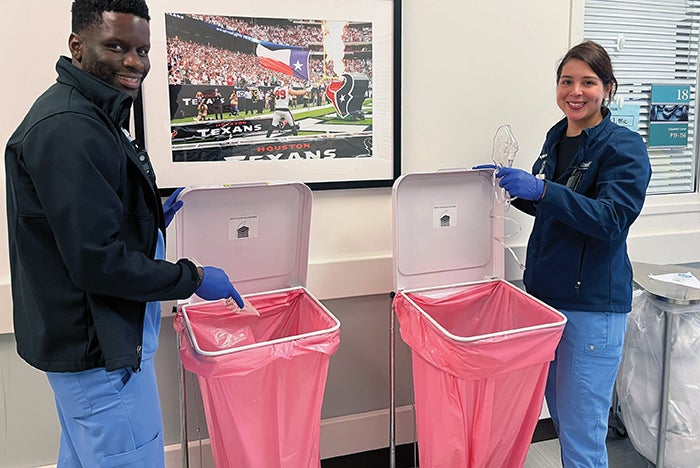Leading health care organizations zero in on diverting waste

Houston Methodist employees have embraced the “Choose Pink” initiative to help divert medical supply waste from municipal landfills.
Image courtesy of Houston Methodist
In 2022, Northern California-based Stanford Medicine Children’s Health committed to a 50% reduction in operational greenhouse gases by 2030 and a target of net zero emissions by 2050. Part of reaching those goals is a commitment to zero waste, or more than 90% diversion of municipal waste from the local landfill.
The organization is well on track to meet its goals. In the last year, Stanford has reduced overall organizational emissions by 13%. In addition, since 2019, the hospital reduced its Scope 1 emissions by 45% and Scope 2 emissions by 19%.
Projects that have contributed to these reductions include fine-tuning and optimizing the building management system, utilizing fault detection technology to identify areas where the building is not functioning as designed, installing window film to reduce heat load, optimizing air exchange rates and, last but not least, zeroing in on waste.
In 2022, Stanford Children’s diverted 1,230 tons of waste (42% of its municipal waste) from the landfill through a variety of strategies, including providing three-stream waste bins for proper waste sorting, switching to compostable containers, reducing sources of waste by investigating supplies that could be reused or reprocessed and disseminating education to staff and visitors.
“The path to our goal is on target and absolutely attainable,” says Christy Foster, director of sustainability at Stanford Medicine Children’s Health. “While each of these strategies plays a critical role, we measure success by evaluating progress and strategies collectively through our annual greenhouse gas emissions inventory. No one program or strategy is better than the next.”
In Lawrence, Kan., LMH Health has partnered with waste treatment and disposal company WasteMedX in Carmel, Ind., to provide safe, environmentally friendly and more affordable medical waste disposal.
WasteMedX utilizes ozone treatment technology to sterilize and shred biohazards, including trace chemotherapy and non-hazardous prescriptions, pathological waste and more, reducing waste volume by up to 90%.
“Before implementing WasteMedX, we had vendors at the main campus every day to transport our medical waste, traveling as far away as St. Louis,” says Bill Churchwell, environmental services director at LMH Health. “Now we’re able to shred the waste in our own facility and use the ozone compound to sterilize the waste and make it completely safe for routine disposal. It is estimated that it could take us six to eight weeks to fill a dumpster before the city picks it up and takes it 5 miles to the landfill.”
In addition, LMH Health estimates saving $78,000 over five years and $329,000 over the 10-year agreement.
“The big benefit of this machine is that we process and dispose of everything ourselves. So, we are able to do away with two different contractors,” Churchwell says. “We were paying $500 or more in additional fuel fees each month to transport our waste and documents. Combine that with the cost of autoclaving or incinerating those products, and those numbers add up.”
Houston Methodist has partnered with Westlake Corp., also based in Houston, and Stericycle in Bannockburn, Ill., to launch “Choose Pink,” a pilot polyvinyl chloride recycling program designed to decrease the amount of waste from hospitals that ends up in landfills. The program, which is being piloted in the hospital’s outpatient unit, focuses on three product types: empty saline/lactated ringer bags, oxygen masks/nasal cannulas and oxygen tubing.
“The most innovative aspect of this program lies in a specifically formulated collection bag that can be incorporated into an automated recycling process that won’t necessitate the breaking open and removal of the collection bags in a manual process,” says Jason Fischer, director of the office of sustainability at Houston Methodist.
The hospital seeks to achieve 50% collection of materials purchased at the system’s flagship Houston Methodist Hospital, with expansion to additional hospital units once the pilot unit achieves a 60% collection rate. The hospital has set a per department goal of 70% collection before it rolls the program out to community network hospitals.




